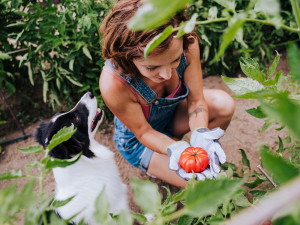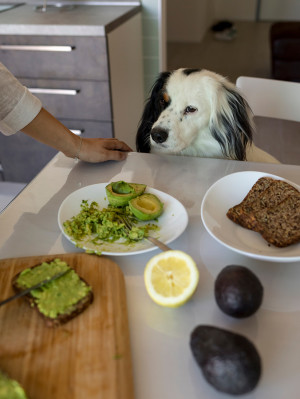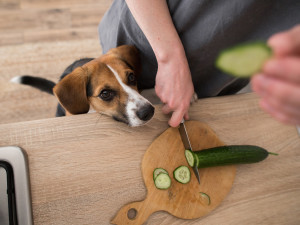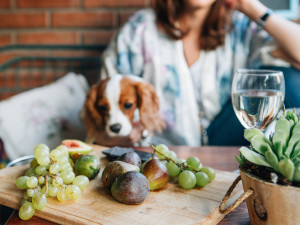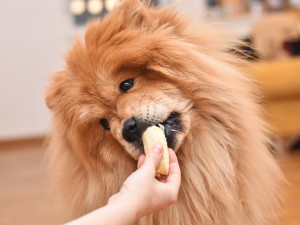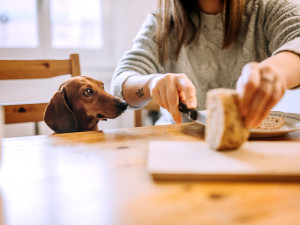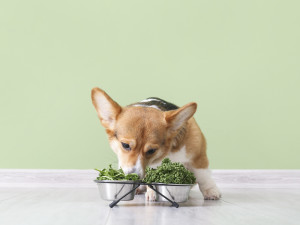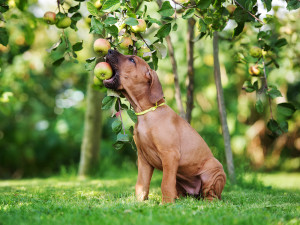Can Dogs Eat Rib Bones?
It’s about to be barbecue season, but that doesn’t mean your pup should take part.

Share Article
There’s a good reason why we describe someone who is relentless as acting like a dog with a bone; once they get a hold of a delicious meaty bone, they will go to all extremes to guard it, protect it and devour it. But the real question is, should dogs eat bones in the first place?
Slow-cooked smoked ribs are an American delicacy, especially heading into the official start of summer. Often an irresistible part of a barbecue, and it is no wonder your dog may be angling for a bite or a rack of their very own.
Unfortunately, this is one food you should not share with your dog for many reasons. Ribs tend to be a fattier cut of meat which can cause problems for many dogs, and the bones themselves are also problematic for our pups. Read on to learn more about why you should keep your baby back ribs all to yourself.
Nutrition facts about rib bones for dogs
There are many different cuts of rib meat from both beef and pork sources including spare ribs, short ribs, baby back ribs, country-style ribs, and flanken. All of these cuts can be prepared in numerous ways, with nearly endless combinations of decadent secret recipes. They all have a few things in common too.
These cuts of meat are fattier and contain more tough connective tissues than other cuts of meat. As a result, they often require long, slow, cooking processes to break down those tougher tissues. In general, dishes prepared with rib meat and rib bones are high in fat and protein, and tend to have a lot of added seasonings and sauces. While some cuts of meat can be good sources of fat and protein for dogs, rib bones are not a good choice for many of these reasons.
Are rib bones good for dogs?
Rib bones are not good for dogs and this one food you should not share with your pups. Here are some reasons why dogs should not eat rib bones:
High in fat: Cuts of rib meat tend to be some of the fattier cuts of meat. While some fat is a good source of energy for dogs, very fatty meats like this can make dogs sick. In mild cases, eating a high fat meal can cause digestive upset like vomiting, diarrhea, and gas. However, in more serious cases, high fat snacks can lead to life-threatening pancreatitis. In addition, eating lots of high fat snacks adds unnecessary calories to their daily diet and this can put dogs at risk for obesity and related health complications.
Added ingredients: Part of what makes ribs delicious and decadent are all the special seasonings and sauces used to flavor them. Most of these recipes are high in salt, added sugar, and fat, all of which are unhealthy for our dogs and can make them sick, as well as lead to weight gain. Many recipes also contain potentially toxic ingredients like onion and garlic, which need to be completely avoided.
Soft bones: Rib bones are notoriously dangerous for dogs because the long, slow cooking process actually softens the bones. As a result, these bones are much more likely to break and splinter, creating sharp edges. When dogs try to eat bones like this, they can be at risk for many problems including choking, damage to their digestive tract including intestinal obstruction, life-threatening perforations, and painful constipation.
Can dogs eat the meat from rib bones?
No, dogs should not eat the meat from rib bones, even if it is removed from the bone. This meat tends to be a fattier cut of meat that can cause digestive upset and even pancreatitis in some dogs. Additionally, most of the seasonings used to prepare ribs are not healthy for dogs as they are high in salt, sugar, fat, and often contain garlic and onions, which are toxic to dogs.
Are rib bones safe for dogs?
Rib bones fall into the off-limit category for dogs. The meat itself is not a good choice for dogs, and the bones are soft enough to splinter and cause serious injury to dogs as they try to chew, swallow, and digest them. Not to mention, many of the seasonings used in preparing ribs are unhealthy and/or toxic to dogs.
Not only should you not intentionally share rib bones with your dog, you should also make every effort to keep them out of reach. Be sure to carefully tie up trash containing rib bones and double check that your dog cannot access it. If you are hosting a barbecue and guests will be eating ribs, keep a close eye on your dog, or confine your dog to a safe space where they cannot sneak a rib when no one is looking. Make sure your guests know not to share any rib bones with your dog too.
Tips for bone safety
Despite the old clichés about dogs with their bones, there are a lot of health risks for dogs when it comes to chewing on and eating bones.
Many veterinarians will tell you to avoid them altogether for the following reasons:
Bones can splinter: Cooked bones, especially slow-cooked bones like those used to make ribs become soft after cooking and can splinter more easily. Sharp pieces of bone can do a lot of damage to your dog's mouth, throat and digestive tract.
Bones are very difficult to digest: Bones are difficult to break down during digestion. They may sit in the stomach for a long time slowly breaking down, which can cause pain, vomiting, gas, and loss of appetite. Pieces of bone that are not broken down can cause blockages in the intestine, requiring emergency surgery. And even pieces of bone that make it all the way to the colon can still cause trouble as they tend to create very hard poop that often leads to a painful kind of constipation known as impaction. Many times, dogs need to be hospitalized to help them pass the bones, and it can be very painful for them.
Raw bones also pose risks: While some pet parents may believe that raw bones are safe and do not carry the same risks as cooked bones, this is not really the case. While raw bones are less likely to splinter, they are very hard to digest and can cause the same kinds of digestive problems if swallowed.
They also put dogs at risk for choking if they attempt to eat a piece of bone. Chewing on raw bones can cause teeth to become worn down and fractured. Finally, depending on the source, raw bones may also carry risks of dangerous pathogens just like the raw meat that accompanies them, putting both your dog, other pets, and people in the home at risk for illness.
Other foods that are safe for dogs
Plain, lean meat, like turkey or chicken breast, is OK for dogs in small amounts, just avoid all skin, seasoning, and bones.
Many veggies, like butternut squash, can be a good snack in small amounts, too.
Apples are a good choice for a crunchy treat.
Other foods that are dangerous
Your dog may be sad to find out that cheese is not a good choice in many cases.
Avocado can also cause digestive upset for dogs and should be avoided.
Chocolate and these other toxic foods are off-limits, too
The bottom line: Can dogs eat human food?
There are lots of healthy and safe human foods that you can share with your dogs, unfortunately ribs are just not one of them. In most cases, the best choices of foods to share with your pup will be plain, whole foods that do not have a lot of seasoning or complicated ingredients.
If you are ever unsure what foods are safe to share, double-check with your vet or a pet-poison hotline before taking the risk. While there are a lot of safe options to choose from, there are also a handful of foods that are really not healthy and can even be toxic to dogs. It is important to know what to avoid.
In general, be sure to keep all treats and table snacks to a minimum to avoid overfeeding your dog and contributing to unnecessary weight gain. Dogs need to get the majority of their calories from a complete and balanced dog food diet to ensure they are meeting their nutritional needs and to avoid any deficiencies. If your dog accidentally gets into a food you know isn’t safe, be sure to contact your vet immediately. Early interventions can be life-saving so get help right away.
FAQs (People also ask):
How many rib bones can a dog eat?
Dogs should not eat rib bones. They can cause illness and damage their digestive tract.
Is it OK to give dogs rib bones?
No, rib bones are not safe for dogs to eat.
Why do dogs like rib bones?
They are likely attracted to the smell and the rich flavors, however, they can get sick from eating them and should not have access to them.
Can dogs eat ribs?
No, even the meat from rib bones can make dogs sick. They should not eat any part of the ribs.
Are bones safe for dogs?
Bones are not safe for dogs. They can cause broken teeth, choking, digestive upset, intestinal obstructions and severe constipation.
References:

Dr. Amy Fox, DVM
Amy Fox, DVM is a small animal veterinarian in New York City. A lifelong animal lover, Dr. Fox studied biology in college and then worked as a veterinary nurse before pursuing veterinary school at Cornell University. She has worked in many different settings including shelter medicine, emergency medicine, general practice, and animal cruelty and forensics. She is especially interested in nutrition, preventative medicine and care for senior pets. Dr. Fox also enjoys writing about veterinary medicine and teaching. In her free time she loves to cook, garden, and go for long runs.
Related articles
Can Dogs Eat Cucumbers?
That cuke crunch is irresistible. Learn if your dog can get in on that action.
Can Dogs Eat Grapes?
The answer is no, no, no — and here’s why.
![A person giving a banana to a dog.]()
10 Fruits and Vegetables That Your Dog Can Feast On
Indulge your pup (safely) with these delicious and healthy snacks.
![A woman cutting a slice of bread from a loaf in a cutting board in front of her Dachshund dog]()
Can Dogs Eat Bread?
The short answer: yes — in moderation. It’s better to go easy on this carb-heavy treat.
Can Dogs Eat Kale?
Yep — this superfood is good for your dog in small amounts.
![Ridgeback puppy eating an apple from a low-hanging tree]()
Can Dogs Eat Apples?
Here’s why this fiber-filled fruit is a healthy treat for your dog.


